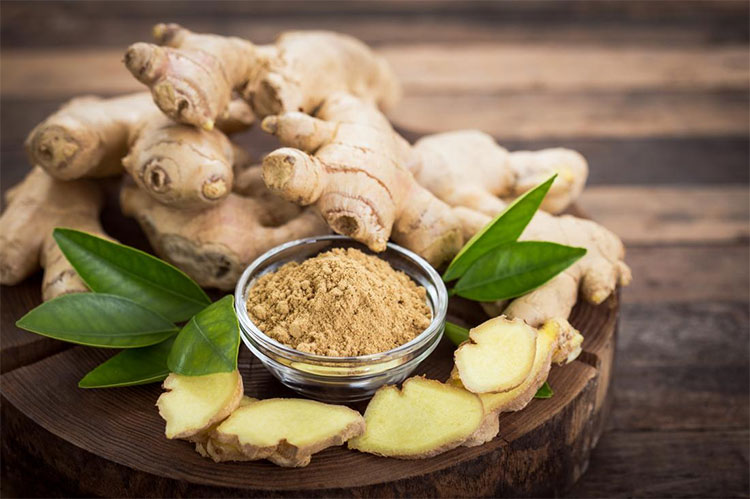70% of traditional medicine prescriptions have a ginger flavor. Because of its miraculous ability, the ancients have a saying: “A slice of old ginger a day, unconventional doctor”. However, improper use is very dangerous.
Be careful when using ginger
Ginger is a plant commonly used as a spice, medicine. In the ginger root contains active ingredients: essential oil of zingiberen, resin, spicy substance, starch.
According to oriental medicine, fresh ginger acts on the meridians, spleen, taste, kidneys and colon, has the effect of warming, fighting the cold, anise and opening. Ginger can be used to treat cholera, colic, bloating, cold limbs, weak pulse, colds, coughs, cold rheumatism …
-
Some uses of ginger
- Warming the heart, strengthening the lungs and being helpless can help “warm up” for older couples. A steamed snail dipped in a ginger fish sauce is one example.
People with motion sickness before getting on the train, if you eat a fresh ginger root with your thumb, will avoid vomiting. Traditional medicine says that by using just a few slices of fresh ginger tied to the wrist, the line that is close to the base of the palm also prevents this nasty disease. This is because ginger can soothe the stomach. This property of ginger is also confirmed by British scientists through experiments on 60 women. Before the surgery, they were given ginger powder and as a result, they had no stomach pain during the surgery.Cure Upper Respiratory Tract Infections (Including Sore Throat): Use fresh ginger and white radish (two equal parts), crush them with a little salt to suck or squeeze the nasal passages 3 times a day. It is possible for people suffering from colds, asthma, cough, sore throat … to eat a bowl of hot porridge cooked with ginger or hot ginger tea.
For people who are hit by the wind so violently that they lose their speech: An effective first aid method is to open the victim’s mouth and pour in fresh ginger juice. Ginger is also used to beat the wind. Because it does not scratch the skin, but has antiseptic properties and warms, stimulates sympathetic nerve endings, wind with ginger helps the patient to increase resistance, quickly recover from the disease.
Sprains, bruises, swelling and pain caused by falls: crush fresh ginger with a little salt on the painful area, let stand overnight. Using crushed fresh ginger soaked in alcohol for massage can relieve pain of all kinds.
Marinating ginger for 30 minutes before storing meat and fish (especially marine fish such as tuna and scad) not only increases the aroma, but also helps detoxify and remove allergies from fish and meat. This is because ginger contains a proteolytic enzyme.
Immunity: Ginger can help strengthen the body’s immune system, helping you fight colds, flu, and other ailments. Just one ginger root per day will help prevent strokes and heart attacks because it helps inhibit the build-up of fat that normally clogs arteries. You can drink ginger tea or use ginger as a condiment in dishes several times a week. This way, you can significantly reduce your risk of serious illness.
Headaches: Ginger can help relieve headaches, even migraines. For headaches, you don’t need to eat or chew ginger. Instead, you can mix ginger powder with water into a paste and apply it on your forehead. It will help reduce inflammation in the blood vessels, thus relieving headaches. Many people experience headaches when the weather is cold, mainly from sinusitis, and it can help them enjoy winter without worrying about a headache that comes in every morning.
Period Pain: Using ginger to make tea can help relieve period cramps. You can buy ginger tea or brew it from fresh ginger and steep for 10 minutes. Drinking it several times a day during your period will make the pain go away, and in more severe cases, it may also help them feel better.
Skin wounds: Ginger has strong antibacterial properties that help heal cuts or wounds on the skin much faster. You don’t need to apply ginger to the sore for it to work. Just drink ginger tea or add ginger to dishes every day, the wound can heal quickly. Thanks to its antibacterial properties, ginger can also help heal infected wounds.
Fever and chills, chills: When you have a cold, the fever is often accompanied by chills and chills, but you don’t worry if you drink some ginger tea every day. Since ginger helps stimulate the secretion of mucus, it will help reduce congestion. Also, stopping drinking tea before the onset of fever and chills will help prevent them from occurring. You can absolutely buy ginger tea from natural or made stores
Bad uses of ginger are dangerous for your health
- Eat ginger for a long time: People suffering from the following diseases should not eat ginger continuously: yin yang, clear heat, pimples, pneumonia, pulmonary edema, pulmonary lymphadenitis, gastritis, liver inflammation, nephritis, diabetes …
Use ginger for sunstroke: When you have a cold, ginger juice will be very effective. However, unlike in cases of heat, cold or sunburn, ginger is absolutely not allowed.
Eat Crushed Fresh Ginger: Surely many people do not know that fresh ginger root, after being crushed, will produce powerful toxin which can cause liver cell necrosis, which will turn into liver cancer, cancer. Stomach.Note: do not eat peeled ginger. Many people peel while eating ginger not knowing that ginger peels have many medicinal uses as well. So when you eat ginger, you have to wash it and then use it according to the purpose.

People taking antihypertensive drugs or diabetes medication should avoid ginger.Who shouldn’t use ginger
People with blood disordersGinger increases flow and promotes blood circulation, so it’s ideal for people with obesity, diabetes, peripheral artery disease, or Raynaud’s disease (a vascular disease). However, people with blood clotting disorders should not use ginger, which makes their condition worse.
This is an inherited blood clotting disorder caused by a decrease in the ability to clot, which means that a small wound can lead to death if the bleeding is not stopped quickly.
As a result, ginger can thwart the effectiveness of drugs used to treat disease and make the disease worse, even causing bleeding and leading to death.
When taking certain medications
People who take antihypertensive drugs or medicines for diabetes should avoid ginger because this root can affect the effectiveness of the medicine.
Combining ginger with certain medicines such as blood thinners, beta blockers (commonly used in cardiovascular disease) or insulin-based medicines (to treat diabetes) can also be harmful to the body.
Specifically, ginger has the ability to thin the blood, lower blood pressure, and the properties of these drugs.
Underweight people
Ginger is a great natural spice for people who want to lose weight because it has the ability to increase the pH of the stomach and stimulate digestive enzymes. From there, ginger reduces appetite and stimulates fat burning.
People who are underweight should avoid ginger as well as ginger supplements.
Pregnant women

During the last trimester of pregnancy, ginger should be absolutely avoided.
Ginger can cause uterine contractions that lead to preterm labor. Especially in the last trimester of pregnancy, ginger should absolutely be avoided.
You can use ginger for morning sickness relief, but you should consult your doctor before taking it.
If you belong to any of the above groups, you can replace the ginger with sweet peppers, red chili powder.
Ms. Milka Raicevic, a famous nutritionist in the world, said that the effect of peppers is similar to that of ginger. You can use chili powder if you like spicy foods or peppers if you don’t want ginger.
- Warming the heart, strengthening the lungs and being helpless can help “warm up” for older couples. A steamed snail dipped in a ginger fish sauce is one example.


